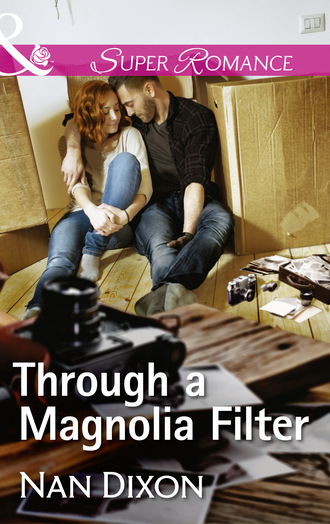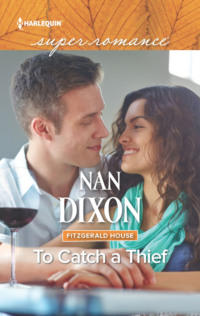
Полная версия
Through A Magnolia Filter
“Thank you for making an exception during the holiday.”
“You are very welcome.”
“I rescued him. He was corralled by the Saint Peter School ladies.” Dolley raised an eyebrow. “They were overwhelming him.”
“They offered to help with my research.” Liam winced. “Even the women who weren’t Irish.”
“What are you researching?” Abby asked.
“Savannah’s Irish roots. For a combination book and documentary.”
“That sounds like fun,” Abby said.
“It will be.”
“Since your tea was interrupted, would you like a cup in here?” Abby offered.
“Yes, please.” His words rushed out. “I’d kill for one.”
Dolley snatched up a couple of the warm cookies.
Abby smacked her hand. “I’ll serve. Go light the fire.”
“They’re best right out of the oven.” Dolley moved back to the sitting area. Passing Liam a cookie, she whispered, “I filched one for you, too.”
He grinned, a wicked pirate grin that promised adventures and fun. It was the first smile she’d noticed crossing his face.
She frowned. He hadn’t smiled at all last night.
“I won’t rat on you.” He leaned close, his dark, wavy hair brushing next to her ear. “But I’d best get rid of the evidence.”
She couldn’t help inhaling his scent. Could cologne be addictive?
Liam took a bite. His eyes closed. “Oh, my,” he mumbled, his mouth full.
“I know.” Dolley devoured her cookie and then pushed the buttons on the gas fire. It lit with a whoosh.
“I saw that,” Abby scolded, although she was smiling. She set cookies and bars on the coffee table.
“These are incredible.” Liam plucked another cookie from the platter.
It was a sacrifice, but she nudged the cookies closer to him. A sugar high might lull him into agreeing to the apprenticeship.
Abby set a teapot with cream, sugar and mugs on the table. “I’d love to chat, but I need to refresh the tea.”
“Go.” Dolley waved her off. Besides, she didn’t want Abby finding out about her request for a mentorship. Especially if Liam said no.
He poured cream in his mug and added tea. “It’s nice to get a real pot of tea. Some places I stay, I can hardly find a tea bag.”
He prepped a cup for her. She couldn’t think of any man ever making her a cup of tea, or much of anything.
“How was your morning?” She slipped deeper into her chair.
“I took a long ramble around the squares, getting my bearings.” He took another cookie. “Savannah is beautiful.”
“Wait until the azaleas bloom.”
“And when will that be?”
“Early March,” she said. “They peak around the St Patrick’s Day invasion.”
“I can’t wait.” Liam took another cookie. “I want to film the festivities.”
She sipped her tea. How could she steer the conversation to the apprenticeship? “Did you take any pictures?”
“Thought I would scope things out first.” He downed his tea. “But I took a couple.”
“When you’re doing a documentary, do you think in photographs or film?” she asked, not sure how to blurt out her request.
“No one’s ever asked me that question.” He refilled his mug and slid back in his chair. “Both, I guess. I see moments that unfurl into scenes, into movement or a story.” He shook his head. “That sounds thick.”
“I see that.” Her pictures tended to be of the B and B, but it was pictures like the ones of Mamma’s wedding, where Martin was twirling her in a circle, that she loved. It was a story of joy. “I get it.”
“I did do one other thing today.” Liam pushed back his black hair. It was thick and long enough to curl around his shirt collar. What would his hair feel like?
She refocused on his face, although that was distracting, too. “What?”
“Called my producer. I’ve got room in the budget to put you on the payroll.”
Dolley’s feet hit the floor. “You do?”
“You can be my—Savannah guide.” He held up a hand. “I’m not promising an apprenticeship. I’d want to assess your skills before I commit. Are you still interested?”
She juggled her mug, setting it down before she spilled. This didn’t sound like an apprenticeship. “I’d be on trial?”
“Probation. It won’t be much money.” He named an hourly rate that was barely over minimum wage.
Her stomach dropped. She still had to live. “How many hours a week?”
“Let’s say—ten to fifteen to start. If I need more hours, we’d reassess the money.” Liam leaned close enough for her to catch a heady whiff of his cologne. “Is the money a problem?”
Money was always a problem for the Fitzgerald family, but she wouldn’t tell Liam that. She wanted a chance to improve her skills. This might be her big break or it could be a lowly gopher job. How would she pay her bills?
“I’ll see if I can cut back my hours at work.” She kept her tone calm, when inside, everything started to shake.
He frowned. “I thought you and your sisters ran the B and B?”
“We do. I also work for a website design company.” Jackson had always let her flex her hours.
His dark eyebrows almost formed a straight line. “I don’t want to mess up your job.”
“You won’t.” She picked at the pleat in her pants. “I’d planned to cut my hours when Carleton House was up and running.” Not quite this many hours. “It’s no problem. Really. I’ll just do this a little earlier. Really.” Now she was babbling like her sister’s fountain.
“You’re sure?” A puzzled look crossed his face.
“Really.” Had she really said really again? “When do you want me to start?”
“Can you give me a half day tomorrow? Say, in the afternoon.”
“Perfect.” She’d get to the office early, finish the website she was working on and then talk to Jackson. With an early delivery on her current project, she’d soften him up. Then she’d tell him about cutting her hours.
If she survived her probation, this might be the start of a new career and the end of an old one. Her hands shook, and she tucked them under her legs. “Why don’t I meet you here at one thirty? I’ll drive.”
* * *
“THE DUNES’ WEBSITE just went live.” Dolley leaned against Jackson’s doorway.
He glanced up from his array of screens. “When was it due?”
“Next week.”
He smiled. “Wonderful.”
“Hold that thought.” She moved into his office and settled into a guest chair.
“What’s up?”
She cleared her throat. “I need to cut my hours a little earlier than I thought.”
“You and your sisters having problems at the B and B?”
“No.” She took a deep breath. “I have an opportunity to apprentice with a world-class photographer.”
“And that affects your work—how?”
She swallowed. “I need to cut back to ten to fifteen hours a week.”
If Liam took her on, she’d end up working long hours for a while. Somehow she would juggle her job, working with Liam and the B and B. Her stomach churned. Who needed sleep?
“Ten hours?” Jackson was shaking his head. “You’re my best designer. People ask for you.”
“They do?” He’d never told her that.
“Yeah, they do. What’s with the photography bug anyway?”
“I...I like taking pictures.”
“Then you can take more shots like you did for—” he snapped his fingers “—that...that pub last fall.”
“I want more than having my pictures on other people’s websites.” She was tired of fading into the background just like in her family.
Jackson shoved his fingers through his short curly hair. Bad sign. “I’ve given you a lot of leeway.”
She nodded, a chill running down her back.
He aimed his dark brown gaze at her. “When you wanted to flex your hours, I didn’t complain.”
Her hands clasped together in her lap. “I hope you know I appreciate that.”
He waved her statement away. “You have more latitude than any other designer.”
Was there a but in his tone?
“I don’t know if I can let you drop below thirty hours a week. I definitely can’t grant any benefits at the levels you’re talking about.”
“What are you saying?” her voice squeaked.
“You’ll have to become an independent contractor.” He froze her with his stare. “No benefits. And you’d bid each project.”
Bid. Not get a salary. Not even get an hourly wage. If she had problems with a site, she could end up working for pennies. She’d assumed she would be paid hourly from now on.
If Liam didn’t take her on, she’d just burned a major bridge. She wouldn’t have steady income. She wouldn’t have money being set aside for her retirement. She’d have to go on the B and B’s health plan. Sweat trickled down her back.
She let out a shaky breath. “When do you want me to start bidding?”
* * *
LIAM GLANCED AT his watch. The day was crawling. He had another half hour before he saw Dolley again.
She’d accepted his offer, even though he hadn’t committed to mentoring her. He wasn’t sure he wanted to take on the responsibility that came with an apprenticeship. Bonds formed if he worked that close with someone. Kieran, his only apprentice, had betrayed their friendship.
Would Dolley be as ambitious as Kieran? He didn’t have to decide right away, but he couldn’t keep her dangling, either.
He slipped the Savannah history book back on the shelf of the Fitzgerald House library. He hadn’t found anything new in it. Then he checked the grandfather clock in the hall to make sure his watch was correct. 1:10 p.m.
This was odd. He’d never been bored on a project. And he wasn’t bored. He just wanted to see Dolley and soak up some of her sparkling energy.
Guilt had him rolling his shoulders. He’d agreed to work with her because he was toying with the idea of using the Fitzgeralds as the core of his film. The documentary could highlight the difference between James’s journey to America and the poor Irishmen who built canals and railroads and oversaw plantations.
James’s letters might be the carrot to get what he wanted—an exposé on the difference between the Fitzgeralds’ ancestors and the countrymen who fled Ireland during the potato famine. The age-old conflict of rich versus poor. Haves versus have-nots.
Hopefully, spending time with Dolley would determine the perfect approach to integrate their family into his film. He didn’t want the sisters tossing him out on his arse.
The clock read 1:15 p.m. He headed to the dining room to grab one last cup of coffee.
“Hi, Liam.” The newlyweds he’d met at last night’s wine tasting were pouring mugs of coffee.
“Hey, Becca, Hale. Did you have a good time at the fort?”
“We did. Now Becca wants to shop.” Hale rolled his eyes, but was grinning.
“Oh, stop.” She added cream and sugar to a mug and handed it to her husband.
The couple shared an intimate smile that had Liam shifting on his feet.
“Thanks.” Hale touched Becca’s cheek as he took the mug.
What was it like to have someone know how you took your coffee?
“See you at the wine tasting tonight?” Hale asked, taking his bride’s hand and heading out the door.
“I’ll be there.”
Maybe coming to a B and B that catered to newlyweds was not the place for him. Why have what was missing from his life shoved in his face every day?
Quick footsteps echoed out in the foyer. Dolley entered the room and filled it with light.
“Hi.” She took a mug, poured coffee and took a deep drink. Her eyes closed. “I needed that.”
“Tough morning?” he asked.
“Just issues I have to work through.” She smiled, but it wasn’t the joy-filled smile he’d seen before.
“Anything you want to talk about?” His knowledge on website design could fit in a teacup, but he could listen.
“No.” She sipped her coffee and hummed.
He couldn’t tear his gaze away from her face. He’d never watched someone who was that into the moment. Her peach-colored lips wrapped around the edge of the cup. Her pale throat moved up and down as she swallowed.
If he took her picture, would it translate onto film?
Her green eyes blinked open. “Where would you like to start?”
He shook his head. What she was talking on about?
One corner of her mouth turned up. “Where do you want to go this afternoon?”
“Oh.” He finished his coffee, dredging up his plan. “I’d like to check out cemeteries.”
“Good.” She shifted her bag higher on her shoulder. “Which one?”
“The one with all the statues.”
“Bonaventure. I love going out there.”
“And the Catholic Cemetery.” He set his empty mug on the tray set up for dirty dishes.
“Here’s a little-known fact.” She raised an eyebrow. “The colony of Georgia forbade the practice of Catholicism.”
“Really?”
“It didn’t change until after the Revolutionary War.” Her smile was coming back.
“Fascinating.” Having Dolley around was going to help focus his research.
“We can’t do both cemeteries justice in an afternoon.” She set her mug next to his. “You’ll need to choose—statues or Irish?”
“Statues.”
“Grab your cameras. I can’t go there without taking tons of pictures.”
He pointed to his camera bag. “Ready.”
“Okay, then.” Dolley led him to a small Volkswagen.
“I pushed the passenger seat back as far as it could go.” Dolley glanced over at him. “You have a lot of leg.”
He tucked himself into her car. “Next time we take my rental.”
“What are you driving?”
“Audi sedan.”
Her grin was full and happy. “Will you let me drive?”
He shook his head. “I don’t think I can.”
“Drat.” She drove with one hand on the wheel and the other on the stick shift. “We’ll circle a lot of the squares. This is Columbia Square. That’s Wormsloe Fountain. It came from the Wormsloe plantation, which was down on the Isle of Hope. It was owned by—” she tapped her nose “—Noble Jones. In the mid-1700s.”
She continued to give him background as they passed through the historic district.
“How do you remember it all?” he asked. “I wouldn’t be this good a guide if you came to Ireland.”
“Oh, I wish I could see Ireland.” Her fingers drummed on the stick shift. “I do the historical write-ups for the B and B’s blog.”
“I’m impressed.”
As Dolley drove, she spouted off information like she was a fountain. She intrigued him. Easy on the eyes, and she smiled—all the time.
He wanted what she had. She and her sisters worked together. Their family owned a mansion their ancestors had built. He wanted to be part of something that—deep. Have roots sunk into bedrock, so no one could yank them free.
What would his life have been like if his parents had survived their car accident? Would he have smiled more? Been happier?
He would never know. He’d been torn away from everything and everyone he loved and forced to live with Seamus.
“Liam?” Dolley jostled his elbow. “Where’d you go? You’re frowning.”
“Sorry.” He forced himself back to the car. “I hope I didn’t miss anything.”
“Maybe I should tape my tour guide talks.”
“Would you?”
She shook her head. “I was kidding.”
“I’m serious.” He turned toward her, their knees bumping. “Do you know much of how your ancestors got here?”
“Us? Our immigration was generations back. I don’t even know how many.” She shook her head. “Well, I do. My four-time great grandfather James Fitzgerald left Ireland in 1830. Came with some money and invested it in warehouses and shipping. Eventually, he was a part owner in the bank.”
“Facts just roll off your tongue. You’re some kind of walking computer, right?”
Her jaw clenched. “Something like that.”
They left the historic district. Squares no longer appeared every few blocks, but Spanish moss still swung from the massive oak trees, sheltering the streets. She pulled under a stone archway and into a small parking lot.
“We’ll walk from here.” She pulled her bag crossways across her chest. The strap molded her sweater to her breasts.
He shouldn’t admire the effect. She was essentially an employee.
He unfolded his legs. Grabbing his bag, he waved. “Lead the way.”
They walked between two weathered rock posts. Roads angled away from a building labeled Information. Avenues of oaks dressed with moss shaded the drives.
The cemetery stretched far as he could see. What a difference from the small graveyard set on a Kilkee hill where he’d buried his godfather.
He should find Michael FitzGerald’s grave in Ireland and see if he could find James Fitzgerald’s grave here in Savannah. He could use the two graves in the documentary.
Dolley led him deep into the cemetery.
Small stone borders, wrought iron fences or rounded tiles separated most of the family plots. There were headstones and markers. Some monuments had piles of stones on the memorials.
“Do they still bury people here?” His voice lowered in respect.
She nodded.
Their tree-lined road narrowed, changing to dirt, shells and sand. Birds serenaded them from the trees. In every direction, statues of angels, people and obelisks had blackened with soot or lichens. Some plots had signs that said Do Not Maintain. In those sections, headstones were tipped and weeds were knee-deep. Others were trimmed and looked like good spots for a garden party with their conveniently placed stone benches.
“When my great-grandmamma was young, they would picnic here. It was a social event.”
“They’d eat lunch in a cemetery?” On second thought, it sounded morbid.
“Over on the banks of the river.” Her smile crinkled her eyes. “We like eccentricities in Savannah.”
At a crossroads, signs pointed to different graves. Dolley stopped in front of a black iron picket fence. “This is Little Gracie Watson, probably the most photographed statue of Bonaventure.”
He knelt to peer through the pickets. The statue of the little girl was beautiful. Gracie sat wearing a dress that looked as if it would ruffle in the breeze. Her hair curled around her shoulders, and her eyes were magnetic.
“She was six when she died from pneumonia. A beloved fixture at Pulaski House Hotel, near Johnson Square.” Dolley’s smile was pensive. “The statue was made from a photograph.”
“It’s lovely.” The little girl’s face was sweet.
“There are rumors her ghost haunted the last people to live on the cemetery property. Of course that story could be made up for visitors.” Her smile was just this side of cheeky. In a deep voice she said, “They say her statue stays warm at night, as though it’s alive.”
Liam had a healthy respect for the spirits. “So you’ve been here at night?”
“Kids in high school would sneak over the fences.”
“Did you?”
“I was pretty studious, and we all needed to help Mamma with the B and B.” She shook her head. “I wish we could get inside the fence, but with so many people visiting her grave, they needed to protect Gracie.”
She pulled out her camera, squatting next to him. Her shutter clicked several times.
“Let me see,” he said.
She handed him a good quality Nikon. Her photos were nicely composed, clear.
“What emotion were you trying to evoke?” he asked.
She winced. “I wasn’t thinking about emotions.”
He tapped her nose, and she blinked. “Always think about what you want a viewer to feel. Even when shooting pictures of inanimate objects.”
“No one ever said that in any of my classes.”
He raised his eyebrows. “Do you see that branch?”
She nodded.
He pulled out his camera, squatted, angling his body, and waited. The branch swung in the slight breeze and dropped into the frame. Click.
In the next picture he refocused on the bars, giving the photo an ominous feel.
“Depending on whether you’re going for eerie or happy, I’d suggest using black and white or color.” He handed Dolley his camera. “Especially if the branches behind Gracie flower.”
She scrolled through the ones he’d taken. “Your pictures are—sad. Bleak.”
“Good. I was thinking desolate. It would come across better in black and white.”
Her auburn eyebrows snapped together, shadowing her lovely green eyes. “Yes.”
“All great photographs evoke emotions, even when you’re looking at a landscape or cityscape.”
She looked up at him and sighed. “I have a lot to learn.”
“You just have to put your soul into your photos.”
“That’s all.” Her eyes twinkled as she handed back his camera. Their fingers brushed. He pulled away, but he’d felt—something.
“Come on.” She replaced her lens cap and slung the camera over her shoulder. “There’s more to see.”
Dolley kept up a stream of interesting facts, talking about the cemetery and graves they passed and the statues created for the interred Savannahians.
When she talked about bodies that had been moved from another cemetery, he finally asked, “How do you retain all this information?”
“I...just remember things.” She wouldn’t look him in the eye.
He pulled her to a stop and made her face him, holding her hand so she didn’t escape. “You have a photographic memory.”
She stared at their dusty shoes. “Not quite.”
“This is fantastic.” He thought of all the notes he had to take to retain everything she stored easily in her brain. “Do you remember my credit card number?”
“No!” She tried to pull her hand away. “I make sure I don’t.”
“What do you remember of my particulars?” He was really curious.
She bit her lower lip, changing the color from pink to red. “Your phone number.” She rattled it off. And then added his address and the date he’d first called. “It’s kind of a pain.”
“I wish I had your memory.” He slung an arm around her shoulder. “Maybe I need to change your job title to fact checker.”
“I don’t think so.” She nudged his arm away. “I’m hoping you’ll teach me how to be a better photographer.”
Either she didn’t like to be touched or didn’t like him touching her. He forced a professorial tone into his voice. “And your first lesson was emotions.”
“You want emotions? Let me show you Corrine.”
She led him toward a river.
“Where are we?” he asked.
“The Wilmington River. This is where my great-grandmamma would picnic.”
She stopped in front of a large plot. Lawton. The statue was a beautiful woman sitting in front of her headstone. “Corrine was in love with a man who was not of her class. Her family insisted she marry a man she did not love.”
He checked the date of her death, 1877. There would have been class issues at that time.
“The day of her wedding she rode to the Savannah River and drowned herself.” She raised a graceful hand, pointing to the statue of Jesus at the back of the plot. “Her family was so upset, they buried her with her back to Jesus.”
“How sad.”
She grinned. “It’s a ghost teller’s story. Corrine wasn’t engaged. Her parents weren’t forcing her to marry. Based on letters and her obituary, she was ill, possibly yellow fever since Savannah had an epidemic that started in 1876 and continued into 1877. The statue was carved in Sicily.”
She bumped her shoulder into his chest. “I told you the fake story because I want you to be aware that the tales told in our fine city are not always the truth.”
Dolley pulled the lens cap off her camera. “She’s my favorite statue.”
Liam moved next to her, trying to see what she was framing. In the distance, faint streams of lavender and pink threaded through the clouds. He pulled his camera up to his eye. Would the sunset be too far away?
Dolley waited. And waited. Finally, the sky flooded with color. Her camera clicked away. It was a joy to watch her concentration.
He knelt behind her, wanting to see what she’d done.
Pulling the camera away from her eye, she replayed her photos, tipping it so he could look over her shoulder.
The statue was swathed by the soft sunset as if Corrine were an angel caught in the clouds.
“Peace,” he whispered. “I feel it.”
“Yes.” She stared into his eyes. “That’s what I wanted.”









